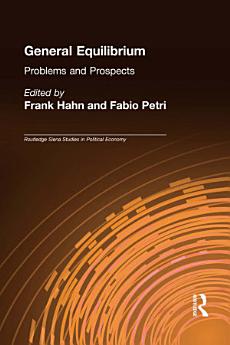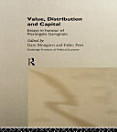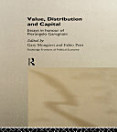General Equilibrium: Problems and Prospects
Frank Hahn · Fabio Petri
ছেপ্তে ২০০৩ · Routledge
ইবুক
544
পৃষ্ঠা
family_home
যোগ্য
info
reportমূল্যাংকন আৰু পৰ্যালোচনা সত্যাপন কৰা হোৱা নাই অধিক জানক
এই ইবুকখনৰ বিষয়ে
In recent years certain leading figures in the world of economics have called the usefulness of general equilibrium theory into question. This superb new book brings together leading economic theorists with important contributions to the ongoing debate.
General equilibrium theorists including Michio Morishima, Michael Magill and Martine Quinzii debate strengths, weaknesses and possible futures with leading thinkers such as Herb Gintis, Pierangelo Garegnani and Duncan Foley, who seek to explain the rejection of general equilibrium. Uniquely, none of the contributors portray general equilibrium theory as the perfect guide to market economies actual behaviour, but rather illustrate that there is insufficient acquaintance with existing alternatives and that general equilibrium theory is often used as an ideal 'benchmark'.
General equilibrium theorists including Michio Morishima, Michael Magill and Martine Quinzii debate strengths, weaknesses and possible futures with leading thinkers such as Herb Gintis, Pierangelo Garegnani and Duncan Foley, who seek to explain the rejection of general equilibrium. Uniquely, none of the contributors portray general equilibrium theory as the perfect guide to market economies actual behaviour, but rather illustrate that there is insufficient acquaintance with existing alternatives and that general equilibrium theory is often used as an ideal 'benchmark'.
লিখকৰ বিষয়ে
Fabio Petri, Frank Hahn (University of Siena)
এই ইবুকখনক মূল্যাংকন কৰক
আমাক আপোনাৰ মতামত জনাওক।
পঢ়াৰ নির্দেশাৱলী
স্মাৰ্টফ’ন আৰু টেবলেট
Android আৰু iPad/iPhoneৰ বাবে Google Play Books এপটো ইনষ্টল কৰক। ই স্বয়ংক্রিয়ভাৱে আপোনাৰ একাউণ্টৰ সৈতে ছিংক হয় আৰু আপুনি য'তে নাথাকক ত'তেই কোনো অডিঅ'বুক অনলাইন বা অফলাইনত শুনিবলৈ সুবিধা দিয়ে।
লেপটপ আৰু কম্পিউটাৰ
আপুনি কম্পিউটাৰৰ ৱেব ব্রাউজাৰ ব্যৱহাৰ কৰি Google Playত কিনা অডিঅ'বুকসমূহ শুনিব পাৰে।
ই-ৰীডাৰ আৰু অন্য ডিভাইচ
Kobo eReadersৰ দৰে ই-চিয়াঁহীৰ ডিভাইচসমূহত পঢ়িবলৈ, আপুনি এটা ফাইল ডাউনল’ড কৰি সেইটো আপোনাৰ ডিভাইচলৈ স্থানান্তৰণ কৰিব লাগিব। সমৰ্থিত ই-ৰিডাৰলৈ ফাইলটো কেনেকৈ স্থানান্তৰ কৰিব জানিবলৈ সহায় কেন্দ্ৰত থকা সবিশেষ নিৰ্দেশাৱলী চাওক।






